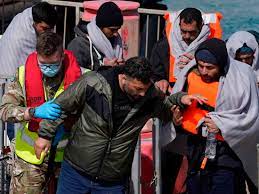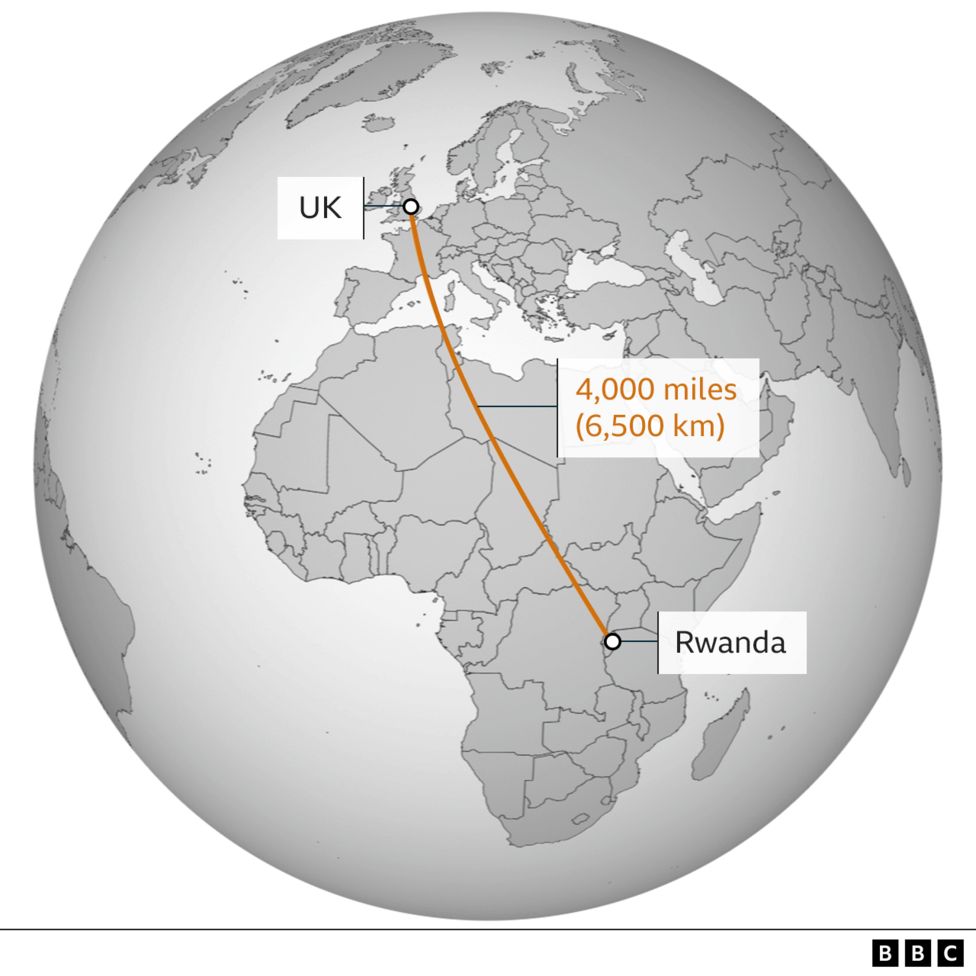
A group of people thought to be migrants are brought in to Dover, Kent, by the RNLI, following a small boat incident in the Channel, Thursday April 14, 2022.
Following a recent agreement signed between the British and Rwandan governments on asylum seekers in the United Kingdom, several international aid agencies report that some asylum seekers in the UK have gone into hiding for fear of being sent to Rwanda.
Under the agreement, people suspected of illegally entering the UK would be flown to Rwanda for resettlement, pending a response from British authorities.
In a joint statement, the Red Cross and the United Nations Refugee Agency (UNHCR) say the threat of deportation has driven some asylum seekers to self-harm, with one person allegedly attempting suicide. For these and other reasons, the two humanitarian organizations criticized the British government’s plans, accusing it of “a breach of duty.”
Moreover, UNHCR argues that this policy of refoulement may be adopted by other European countries.
“We are concerned” that the British “are calling on all their European counterparts to do the same. I can understand from their point of view why they would do that: it would give such arrangements greater perceived legitimacy if others did the same,” Larry Bottinik, UNHCR’s acting representative in Britain, told the Observer.
Denmark, a European nation, has already expressed interest in adopting a similar “refoulement” system, and its own negotiations with Rwanda have been ongoing for some time.
Family Separations Challenged
The measure is retroactive. This means that thousands of asylum seekers, including many families with children, who are currently on British soil, are afraid of receiving a letter from the Home Office announcing their transfer to Rwanda. The Home Office has responded to this by stating that it will make every effort to prevent self-harm or suicide. The government added that the policy is meant to curtail human traffickers’ business models.
Meanwhile, Nottingham-based international law firm InstaLaw filed its first formal challenge to the London-Kigali resettlement plan, claiming that British Home Secretary Priti Patel’s proposals violate international law and the UN Refugee Convention, as well as the British Data Protection Act. Lawyers say the plan is a “publicity stunt” designed to discourage cross-Channel travel. The Home Office now has three weeks to respond to the challenges, after which a possible trial could result in Patel’s challenge before the British High Court.
The law firm cites the case of an Iranian citizen who faces deportation to Rwanda while waiting for London to rule on his asylum application: “He may be the only Iranian in the country, there is no network, no community, no one who speaks the language.” How will he cope, how will he survive?
“How will he get a job and an education?” Stuart Luke, a lawyer, and partner at InstaLaw asks. According to an Interior Ministry spokesman, “our partnership with Rwanda is fully compliant with international and national law. Any legal challenge will be vigorously defended.”
According to a dossier prepared by the organization Detention Action, which is considering filing legal action against the British government with other British organizations, LGBTIQQ+ migrants may face “discrimination.”
Authoritarianism Revealed
What is disturbing about the initiative is not just the fact of being faced with an extreme political proposal, but seeing the emergence of authoritarian thinking that aims to subvert the foundations of a rule of law. Only an exquisitely authoritarian political thought can consider that an agreement between states that affects fundamental rights and freedoms in a very significant way, and which, as the memo itself specifies, ‘will not be binding under international law’, can be implemented without conferring ‘any rights on any individual.”
The unbelievable story of this memorandum teaches us many things. It is no less than other unbelievable laws wanted by Denmark on the right to asylum in 2021 and the illegal rejections of asylum seekers carried out by Poland at the border with Belarus. It is equally no less than the equally illegal and violently implemented rejections of migrants from nations like Greece and Turkey.
A Gross Violation of Human Rights
Beyond the differences between them, these are, on closer inspection, situations that highlight how the violation of the “rights of others” (those of non-citizens) can occur almost invisibly to the rest of society. The management of migration represents the most important and arduous test of today’s democratic systems, and none of the universal human rights – none at all – can be said to be fully acquired: they all remain fragile rights, always at high risk of being denied and forgotten, even in states with the oldest and most solid democratic traditions.
This policy shows how the very public authorities that are called upon to protect human rights are consumed with indifference and inaction. In such a great reversal of principles, in order to combat the international trafficking of human beings, which the policy claims it wants to solve, the victims of trafficking and not the criminal organizations themselves are being criminalized.
Let’s not forget the harm and unimaginable violation of international law this policy causes.

